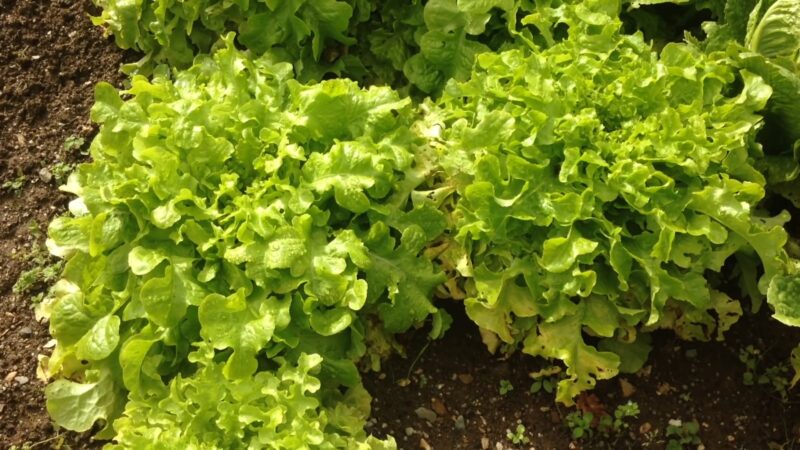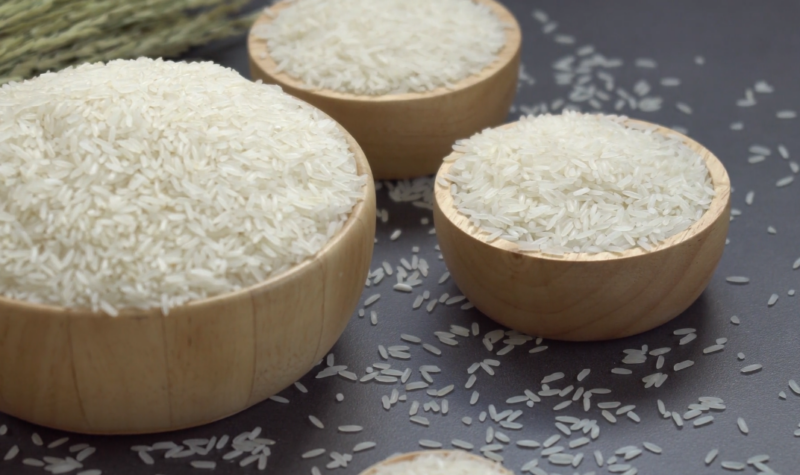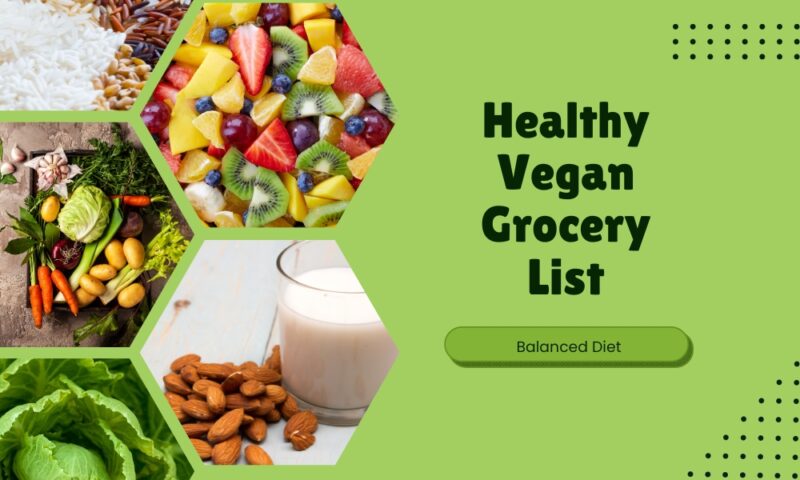When you just switch to a vegan diet, it’s so exciting. You’re introduced to a whole new world of plant foods, different flavors, and health benefits. But there can be some challenges as well. You need to adopt a new way of cooking your meals and figure out which foods to buy. In this article, you’ll discover the ultimate healthy vegan grocery list so you can save your time and always have quickly preparable food at home.
Since I became vegan, I’ve learned a lot about efficient grocery shopping and cooking. But I’ve made quite a lot of mistakes on the way.
For example, although I bought lots of products, they were not good for combining so I couldn’t make a meal. And sometimes I unexpectedly ran out of foods that I use on a daily basis. Or some of my food got spoiled because I couldn’t use it up.
But I learned from my mistakes, and now I spend way less time doing grocery shopping and cooking. And you too could be saving loads of time!
The key to quick and efficient grocery shopping is to not overcomplicate things. This might seem simple enough, but I still encounter people who overwhelm themselves with cooking complicated dishes using uncommon and exotic ingredients.
Of course, this doesn’t mean that you have to get stuck in a rut of boring food. I’ve come to a point where I cook simple bulk recipes during most work days and cook something special and more complicated during the weekend.
Before you dive into the ultimate healthy vegan grocery list, I’d like to share a few essential tips for doing more efficient grocery shopping and cooking healthier meals.
1. Keep your meals simple
To eat a healthy vegan diet, you don’t have to buy fancy, exotic foods or expensive ingredients. And you don’t have to spend hours in the kitchen each day to cook wholesome meals. Instead, use simple cooking techniques like sauteing or stir-frying and combine simple foods like vegetables, beans, leafy greens, whole grains, seeds and spices to make a delicious meal.
2. Focus on buying natural foods
Nowadays there are dozens of different processed vegan foods available, for example, faux vegan meats, vegan butter, cookies and so on. Processed foods are filled with empty calories so your health won’t benefit from these foods as much as whole foods.
3. Buy fruits and vegetables that are in season
They are more nutritious and also usually much cheaper than fruits or vegetables that are not in season.
4. Get to know your eating habits
This doesn’t mean that you should eat the same foods every day (that’s actually unhealthy). However, you should discover which foods you like the best and which you eat most often.
By doing this, you’ll greatly reduce the time spend in the grocery store thinking about what to buy. For example, I’ve dozens of ways how to use peanut butter so I always keep it in my pantry.
5. Get used to reading labels
This is essential not only for identifying if the food is vegan but also for discovering if there are any nasty food additives inside, for example, palm oil. Over time you’ll learn to quickly scan the label and identify which foods are better for you.
6. Save money by buying frozen vegetables and buying in bulk
Frozen vegetables are usually cheaper than fresh ones but their nutrition content is almost the same as for fresh veggies. Also, different brands have different prices so check which one is cheaper.
And keep an eye on discounts! If any frozen vegetables or fruit have a discounted price, take advantage and buy several packages. As they’re frozen, they’ll keep in your freezer for a long time. The same goes for nuts.
And now let’s head to the ultimate healthy vegan grocery list. Use it as a guideline when planning your shopping trips for choosing healthier options and reducing your shopping time. This grocery list includes the most common ingredients, but feel free to vary them according to the season and availability.
Vegetables

Vegetables are one of the most nutritious foods available. To keep yourself healthy, you should base your diet on a whole range of veggies. Also, vegetables are naturally low in fat and calories so they’ll keep you in good shape.
As much as possible, try to buy fresh and local vegetables that are in season. You can also buy frozen vegetables. They are usually harvested at the peak of the season, so they’re as nutritious as fresh vegetables.
• Asparagus
• Avocado
• Beets
• Bell Peppers
• Broccoli
• Brussels Sprouts
• Cabbage
• Carrots
• Cauliflower
• Celery
• Corn
• Cucumber
• Eggplant
• Garlic
• Yams
• Leek
• Mushrooms
• Onion
• Potatoes
• Pumpkin
• Radishes
• Sprouts
• Squash
• Sugar Snap Peas
• Sweet Potatoes
• Tomatoes
• Zucchini
Leafy Greens

Although leafy greens belong to the previous vegetable column, their benefits are so impressive that they should be bought and consumed on a daily basis. That’s why I’ve separated them.
Leafy greens are real nutrition powerhouses and help to reduce the risk of many diseases, for example, cancer and heart disease.
Some leafy greens like kale and bok choi are great to cook, but some are best to eat fresh, for example, spinach, arugula, and romaine. You can also buy frozen leafy greens.
• Arugula
• Bok Choy
• Kale
• Lettuce
• Romaine
• Salad Mixes
• Spinach
• Spring Greens
• Swiss Chard
• Turnip Greens
• Watercress
• Wheatgrass
Fruits

Fruits are great sources of many essential nutrients, antioxidants, and vitamins. They are a good source of dietary fiber which is important for a healthy gut. If you’re on the go, fruit can be a quick and healthy snack. As it’s quite high in sugar, it’ll also satisfy your sweet tooth.
You can buy fresh, dried or frozen fruit. As dried fruits have a long shelf life, it’s a good idea to always keep them around in case you crave something sweet. But if you love to make smoothies, put frozen fruits to use! They’ll add creamy, ice cream-like texture to your smoothies.
Fresh Fruits
• Apples
• Apricots
• Bananas
• Blackberries
• Blueberries
• Cherries
• Grapefruit
• Grapes
• Kiwis
• Lemons
• Limes
• Mangoes
• Nectarines
• Oranges
• Peaches
• Pears
• Plums
• Pomegranate
• Raspberries
• Strawberries
• Watermelon
Dried Fruits
• Apple
• Apricots
• Banana chips
• Cranberries
• Currants
• Dates
• Figs
• Pears
• Prunes
• Raisins
Whole Grains

While refined grains like white flour do your body more harm than good, whole grains are an essential part of a healthy plant-based diet. Nowadays there are many varieties of healthy whole grains in the store.
Whole grains are high in minerals such as zinc, iron, and magnesium. They’re also high in B vitamins and fiber. Don’t avoid using whole grains unless you have a gluten intolerance or celiac disease.
To prolong the shelf life of your whole grains transfers them into mason jars with tight lids and store them in a cool, dark place.
• Amaranth
• Barley
• Rice (brown, black, wild)
• Buckwheat
• Bulgur
• Cornflakes
• Farro
• Millet
• Oats
• Quinoa
• Rye
• Spelt
• Whole Grain Pasta
Legumes
Legumes like beans, peas, and lentils are the best plant sources of protein and an excellent source of fiber. They are also cheap and widely available.
If you buy dried legumes, soak them overnight before cooking. This shortens the cooking time and helps to reduce the phytic acid content and increase the nutritional value. You can also try sprouting and fermenting legumes.
• Azuki Beans
• Black Beans
• Black Eyed Peas
• Chickpeas
• Edamame
• Fava Beans
• Green Beans
• Kidney Beans
• Lentils
• Lima Beans
• Mung Beans
• Navy Beans
• Pinto Beans
• Red Beans
• Snow Peas
• Soy Beans
• Split Peas
Healthy Fats
A lot of people thinks that you should avoid fats at all cost, especially if you’re trying to lose weight. And, indeed, if you consume a lot of saturated, unhealthy trans fats, you’ll gain weight and you won’t feel at your best.
However, your body needs healthy fats to support many functions. So avoiding fat completely can have harmful consequences in the long run. The key is to consume the right kind of fats – unprocessed fats from plant foods.
Best sources of healthy plant-based fats are avocados, nuts, seeds and butter made from nuts and seeds.
Fruits & Oils
• Avocado
• Olives
• Extra Virgin Oils (coconut oil, olive oil, flaxseed oil or other; use in moderation)
Nuts
• Almonds
• Brazil Nuts
• Cashews
• Chestnuts
• Hazelnuts
• Macadamia Nuts
• Pecans
• Pine Nuts
• Pistachios
• Walnuts
Seeds
• Chia Seeds
• Flax Seeds
• Hemp Seeds
• Pumpkin Seeds
• Sesame Seeds
• Sunflower Seeds
Nuts & Seeds Butters
• Almond Butter
• Cashew Butter
• Macadamia Nut Butter
• Mixed Butters
• Peanut Butter
• Sunflower Seed Butter
• Tahini
Spices And Herbs

Add spices and herbs to your food to upgrade the flavor and boost the nutritional content of your dish. Many spices, for example, turmeric and ginger, are antioxidant-rich and have strong healing abilities.
You can use fresh herbs, dried herbs, and even frozen herbs. Try to buy whole spices as much as possible. To get out the best flavor from your spices, ground them just before cooking. Store your spices in airtight containers and keep them in a dry, dark place.
• Anise
• Basil
• Bay Leaf
• Celery Seed
• Chili powder
• Chives
• Cilantro
• Clove
• Coriander
• Cumin
• Curry
• Dill
• Garlic Powder
• Ginger
• Lemongrass
• Nutmeg
• Onion Powder
• Oregano
• Paprika
• Parsley
• Pepper
• Peppermint
• Red Pepper Flakes
• Rosemary
• Saffron
• Salt (sea or Himalayan)
• Thyme
• Turmeric
• Vanilla
Vegan Dairy Substitutes
Nowadays many markets and health food stores offer a wide variety of different vegan dairy substitutes – plant milks, vegan yogurts and vegan cheese. If you used to be a big fan of the taste of cheese, vegan cheese alternatives could be a huge help when you’re transitioning to a vegan diet.
Keep in mind that these vegan dairy substitutes can be highly processed, so read the labels! The fewer ingredients are on the label, the better. Keep an eye on nasty ingredients like palm oil.
• Almond Milk
• Cashew Milk
• Coconut Milk
• Coconut Yogurt
• Hemp Milk
• Oat Milk
• Rice Milk
• Soy Milk
• Soy Yogurt
• Tempeh
• Tofu
• Vegan Cheese
Print Your Healthy Vegan Grocery List
Here is a printable version of the vegan grocery list. It’s compact, easy to read and includes all ingredients mentioned in the post. Take it with you next time when you’re going grocery shopping!
So this concludes the ultimate healthy vegan grocery list. Of course, the assortment of vegan foods depends on the place you live. So keep an open mind and vary with different foods.
Hope you find this list helpful and have fun with healthy vegan shopping!

